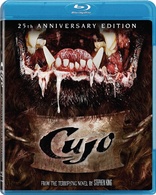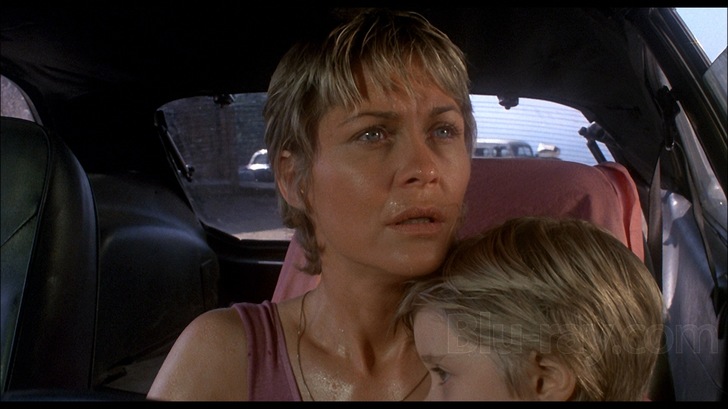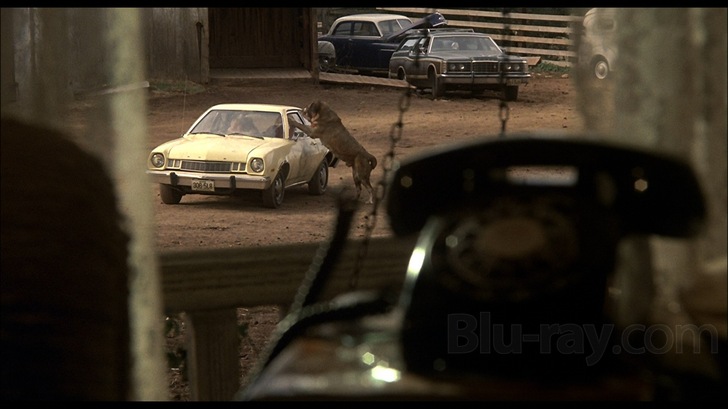Cujo Blu-ray Movie
HomeCujo Blu-ray Movie 
25th Anniversary EditionLionsgate Films | 1983 | 93 min | Rated R | Nov 24, 2009

Movie rating
6.5 | / 10 |
Blu-ray rating
| Users | 3.9 | |
| Reviewer | 3.0 | |
| Overall | 3.7 |
Overview
Cujo (1983)
A friendly St. Bernard contracts rabies and conducts a reign of terror on a small town in New England. Based on the Stephen King novel.
Starring: Dee Wallace, Danny Pintauro, Daniel Hugh Kelly, Christopher Stone (I), Ed LauterDirector: Lewis Teague
| Horror | Uncertain |
| Thriller | Uncertain |
Specifications
Video
Video codec: MPEG-4 AVC
Video resolution: 1080p
Aspect ratio: 1.85:1
Original aspect ratio: 1.85:1
Audio
English: DTS-HD Master Audio 5.1 (48kHz, 16-bit)
English: Dolby Digital 2.0 Mono (224 kbps)
Subtitles
English, English SDH, Spanish
Discs
25GB Blu-ray Disc
Single disc (1 BD)
Playback
Region free
Review
Rating summary
| Movie | 3.0 | |
| Video | 4.0 | |
| Audio | 3.5 | |
| Extras | 3.0 | |
| Overall | 3.0 |
Cujo Blu-ray Movie Review
Man’s best friend, or mom’s worst nightmare?
Reviewed by Casey Broadwater December 3, 2009If you graph out Stephen King’s film adaptations, you’ll find a statistical bell curve, with The Shining and The Shawshank Redemption on the “excellent” side of the quality scale and disposable tripe like Maximum Overdrive representing the low point on the other side of the spectrum. In between, there’s an arc of titles, from the not-so-hot, say, Dreamcatcher, to bona fide genre classics like Misery and Carrie. Somewhere in the middle is Cujo, a modestly thrilling but never outright scary tale of man’s best friend gone rabid. While many of King’s stories deal with some kind of supernatural adversary—an existential dream clown, New England vampires, or beasts from the beyond—Cujo is grounded in the much more mundane fear of a skulking, frothy mouthed canine. In one sense, this might seem to work to the film’s advantage. The nemesis is identifiable, commonplace, even likely to be prowling our own homes, sleeping next to our beds, playing with our kids. But here, familiarity doesn’t breed fear, or even contempt; it just makes us feel sorry for Cujo, a doe-eyed St. Bernard who had the misfortune of getting bitten by a rabid bat.

The saddest dog in the world...
A slimmed and trimmed retelling of King’s 1981 novel of the same name, Cujo circles the Trenton family, who live high on a hill overlooking Maine’s Atlantic shore. Vic (Daniel Hugh Kelly) is an advertising executive who just lost a major client, his wife Donna (Dee Wallace-Stone) is in the throes of an affair with Steve (the late Christopher Stone, The Howling), a local woodworker/tennis stud, and timid son Tad (Danny Pintauro, of Who’s the Boss?) is convinced there’s a monster living inside his bedroom closet. The family’s collective malaise comes to a crescendo when Vic discovers his wife’s infidelity and goes away broodingly on a business trip—in his red convertible—leaving Donna the keys to the junky Pinto in the driveway. The sloppy jalopy begins lurching and bucking like a rodeo bull, and Donna takes it to the home of a backwoods mechanic—who has long since been eaten by our friendly pup-gone-predator— where it promptly sputters out and dies. In what amounts to a castle siege, the increasingly bloody/muddy/mucousy Cujo attacks the barely fortified car, hoping to get a taste of the delectable vittles inside. In the summer heat, the Pinto becomes a sweatbox where Donna and her screaming, asthmatic, and ultimately comatose son roast away three days in terror. The climactic confrontation between woman and beast is inevitable—they’ll die of thirst if Donna doesn’t leave the car—but like a zombie, you can’t keep a good dog down unless you shoot it in the head, which Donna doesn't have the sense to do. One wishes To Kill a Mockingbird’s Atticus Finch was here to deal with such matters.
Director Lewis Teague (Alligator) manhandles the production with a workmanlike knowledge of cinematic tension—it’s all about misdirection—but the thrills are slow in coming. The first forty minutes of the film are devoted to developing the familial disintegration at hand and laying down the narrative tracks that will all-too-conveniently lead to Donna and son being trapped in the car, alone and unreachable. This includes a lot of unnecessary exposition about the family of the redneck mechanic. The machinations exist to simply set the scenario—once the mechanic’s wife wins the lottery and leaves for her sister’s house in Connecticut, we’ll never hear from her again. Her sole role in the film is to let us know that there’s no one at home to save Donna. Likewise, Donna’s illicit affair with her randy, trombone-playing stud—seriously, check out the screenshot—is only the means to an end. All the prolonged characterization at the outset of the film is dropped once its purpose has been served. That is, to elucidate the film’s flimsy subtext: just as Donna is trapped in a stifling car, afraid of what awaits outside, she’s also trapped in a listless marriage, fearful of the now-angry suitor she just dumped.
And Cujo is a fitting stand-in for Donna’s bearded boyfriend. When the dog first encounters Donna, she’s on all fours, peering under the car, her backside exposed. The sexual overtones are subtle but disturbing, and Cujo’s initial attack might as well be a rape; we see him bite Donna’s thigh and immediately think of the rough pawing that Steve gives Donna when she denies his advances. Between this and the film’s abundance of misogynistic men, Cujo would make good fodder for a feminist film theory thesis, if only the movie were more substantial thematically. For all that could be unwarrantedly read into Donna’s predicament—a “dog” is trying to “enter” her “car”—Cujo is really just a simple thriller with a few modest scares. Gorehounds will be disappointed by the lack of blood, and general audiences will quickly tire of Danny Pintauro’s incessant high-pitched screaming (though he does look genuinely terrified). Dee Wallace, of E.T.: The Extraterrestrial, is convincing as a mama bear protecting her cub, but fans of the book will pan the film’s namby-pamby, overly optimistic ending, even though Stephen King basically signed off on it. I hesitate to use such an unsurprising cliché, but Cujo really is all bark and no bite.
Cujo Blu-ray Movie, Video Quality 

Cujo stalks onto Blu-ray with a 1080p/AVC-encoded transfer in its original 1.85:1 aspect ratio. Considering the film's age and budget, it looks quite good here thanks to a print that's been more than sufficiently cleaned up, leaving only a few intermittent white specks. Cujo has never been the sharpest film—portions look like they were shot with some sort of diffusion filter— but it definitely benefits from the upgrade to high definition. Overall clarity is greatly improved; you'll be able to make out the finest beads of glycerin sweat on Dee Wallace's upper lip, and you'll probably gag a little when confronted with the slobbery, shiny globs of mucous that daub Cujo's snout and seep from his big dolorous eyes. Longer shots have a tendency to go a little soft— never distractingly so—but close-ups display plenty of texture and fine detail. Color saturation is also strong throughout, and the combination of bold primaries, adequately deep black levels, and well-balanced contrast gives the image some unexpected depth. The film's grain structure hasn't been tampered with—I don't see any evidence of DNR or edge enhancement—and noise levels only spike during some of the darker scenes. You will notice a distinct drop in picture quality during the "spinning" shot inside the car—a fuzzier look, with heavy grain—but this is because cinematographer Jan De Bont used a periscopic lens that inadvertently softened the image. Overall, I was pleased with this transfer, and this is certainly the best that Cujo has looked since its release.
Cujo Blu-ray Movie, Audio Quality 

I can't really say that Cujo's soundtrack growls, and you'd be barking up the wrong tree if you expect an immersive soundstage, but I'll stop with the puns and get to the audio analysis. For this release, the film's original monaural presentation has been expanded into a DTS-HD Master Audio 5.1 surround track that does its best with the dated source material. The boxy sound effects definitely show their age—especially Cujo's snarls and barks—but the audio here is about as good as could be expected. Dialogue is mostly clear—I'd even say that Danny Pintauro's screams are too piercing—and the voices are balanced nicely in the mix, requiring no mid-film volume adjustments. The surround channels are mostly used to accommodate Charles Bernstein's score, which is surprisingly full, even if it does get repetitive at times. You'll hear a car pass through the rear speakers, a radio humming in the distance, and a lone dog howling somewhere behind you, but that's about it in terms of ambience. There's not much to get excited about, but the expansion into a lossless 5.1 track certainly does the film's audio a few favors. For those who want to compare, the disc also includes a monaural Dolby Digital version of the film's original audio track.
Cujo Blu-ray Movie, Special Features and Extras 

Audio Commentary by Director Lewis Teague
Though he keeps mentioning that Cujo is "the most accomplished" of his films, this track
by Lewis Teague—who also helmed the horror-parody Alligator—is thoughtful and
engaging for most of its duration. Teague gives a lot of background about his involvement with
the project, discusses how certain scenes were filmed—particularly regarding his collaboration
with cinematographer Jans De Bont—and dissects what he sees as the film's theme: real vs.
imaginary fear.
Dog Days: The Making of Cujo (SD, 42:48)
Fans of the film will slobber all over this excellent three-part making-of retrospective, which was
produced by acclaimed special features documentarian Laurent Bouzereau. Part one follows the
story's journey from novel to script to screen, with interviews from all of the key players—with
the notable exception of Stephen King. Part two covers the challenges of working with 6 to 10
dogs—no one can agree on the number—and focuses on the performances and Jan De Bont's
cinematography. Part three keys in on the editing, scoring, and sound effects. Whether you rent
or buy Cujo, this documentary is certainly worth watching if you enjoy the film.
Cujo Blu-ray Movie, Overall Score and Recommendation 

Cujo is a mid-tier Stephen King adaptation that offers a few slight scares to punctuate an otherwise pedestrian family drama. There's not much to be frightened by here, as Cujo's sad eyes inspire more pity than terror. Maybe if he was a German shepherd, but a St. Bernard? Really? I picture him galloping through a field, his jowls swinging happily as he brings Donna some brandy. This Blu-ray edition carries over all the special features from the 2007 25th anniversary DVD, so if you're a fan and you don't have that version, this is a great place to start, especially in light of the better-than-expected picture quality. For newcomers to King's canine tale, however, I'd suggest a rental first.
Other editions
Cujo: Other Editions
Similar titles
Similar titles you might also like

The Pack
2015

Children of the Corn III: Urban Harvest
1995

The Hallow
The Woods
2015

The Void
2016

Splinter
2008

Red Christmas
2016

Pumpkinhead
Collector's Edition
1988

Night of the Living Dead 4K
Theatrical (UHD/BD) and Workprint (BD) versions
1968

Sleepwalkers
Collector's Edition
1992

Poltergeist II: The Other Side 4K
Collector's Edition
1986

Cat's Eye
Stephen King's Cat's Eye
1985

Creepshow 4K
Collector's Edition
1982

Feast
2005

The Texas Chain Saw Massacre 4K
1974

Jeepers Creepers 2
Collector's Edition
2003

Hellraiser
1987

We Are Still Here
2015

The Relic
1997

Graveyard Shift 4K
1990

Hatchet
Unrated Director's Cut
2006


